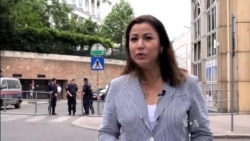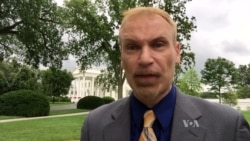The foreign ministers from the group of six world powers and Iran are locked in intense negotiations in Vienna on Monday with key disputes unresolved, including a potential stumbling block involving a push by Tehran to have a U.N. arms embargo lifted.
The so-called P5+1 ministers from the U.S., Britain, France, Russia, China and Germany held a closed-door meeting at the historic and stately Coburg Palace following a day of intense negotiations.
The ministers are making a final push to meet a self-imposed July 7 deadline to reach a comprehensive deal to limit Tehran’s nuclear activities in exchange for sanctions relief.
WATCH: Mary Alice Salinas reports from Vienna
Arms emargo
During a press conference in the Austrian capital earlier, a senior Iranian official told reporters that Tehran is pushing to have a U.N. arms embargo lifted as part of a separate but concurrent deal, a move Western officials have said they oppose.
“Our position is that the UNSC [United Nations Security Council] arms embargo should not be part of a nuclear deal,” said the Iranian official in Vienna. “Our position is that the Lausanne framework allows R&D [research and development] to continue. This issue should not be a stumbling block."
However, a U.S. official close to the talks disagreed, saying the parameters of the framework adopted in Lausanne, Switzerland, in April called for “important restrictions on conventional arms and ballistic missiles” to be incorporated into a new resolution.
U.S. Secretary of State John Kerry and Iranian Foreign Minister Mohammad Javad Zarif have stressed that despite some progress the two sides still must negotiate major differences.
"We are not there yet, I emphasize that," Kerry said Sunday.
WATCH: VOA's Michael Bowman reports from the White House
Progress cited
However, some progress has been reported in key areas, including the pace of sanctions relief for Iran, and a U.N. probe into whether Iran's previous nuclear work involved trying to develop weapons.
Zarif was to meet with members of each of the six negotiating powers throughout the day, and held at least two meetings Monday with Kerry.
The top U.S. diplomat said negotiators remain focused on meeting the Tuesday deadline, which was extended one week beyond the original June 30 date.
On Monday, Tehran signaled it is willing to keep negotiating. “We don't see definite deadlines,” said senior Iranian official. “We know there are certain considerations by the U.S. That doesn't mean everyone agrees.”
The timing of a potential final deal could have implications on Capitol Hill in Washington, where any agreement would face tough opposition in both houses of the Republican-led Congress.
Finalizing a deal by Thursday would limit a U.S. congressional review period to 30 days. After that, lawmakers would get up to 60 days to review the agreement and vote on whether to lift sanctions imposed by Congress.
Niloofar Pourebrahim, Paris Correspondent for Persian News Network, contributed to this report.







